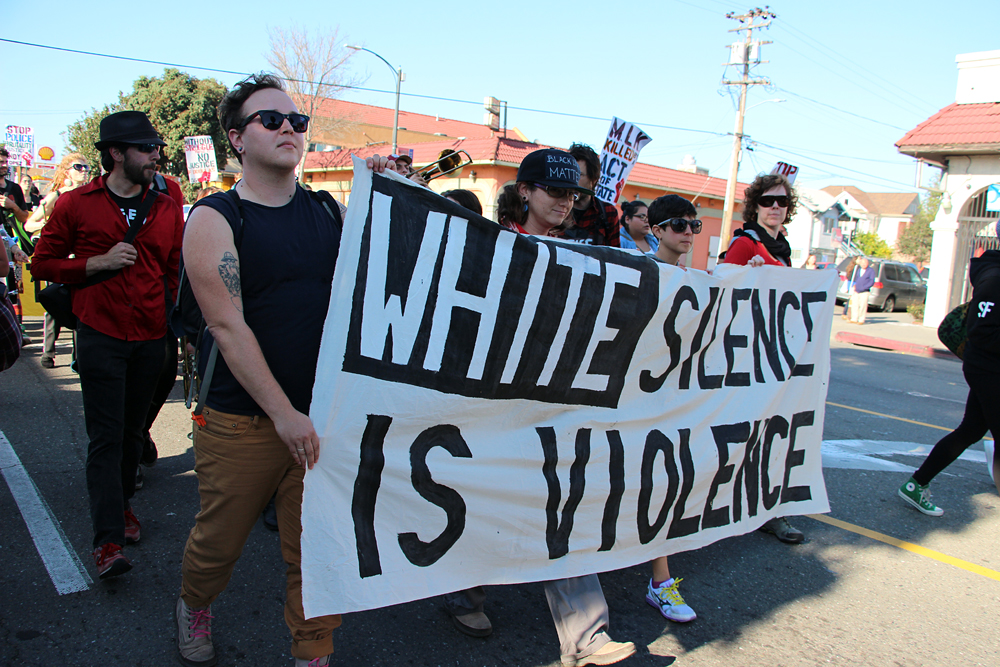EDITOR’S NOTE: Throughout October, we’re engaging in an online book study of Kathy Khang’s Raise Your Voice: Why We Stay Silent and How We Speak Up. Along the way, we’ll offer a reflection based on our readings and discussion. Follow along as we reflect on Chapters 4 & 5 this week.
“If I benefit from the status quo, I have a vested interest in maintaining it. Silence is complicity. Speaking out is often labeled as rocking the boat or causing trouble, but silence is just as dangerous.” – Kathy Khang
White silence. A phenomenon that has existed from the founding of this country until today; white silence has never been without grave consequence to people of color. White silence allowed slavery to create our economic system on the literal backs of Black bodies while not personally owning slaves. It allowed Black bodies to swing from trees, terrorizing communities because it didn’t personally string them up. It bought land that belonged to Native people while they were pushed from their land and slaughtered en masse. It interned Japanese families in horse stalls for years because certainly someone of Japanese heritage isn’t truly American and is unsafe… unlike the white, German family living next door.
When it is said that white silence is violence, it is not hyperbole. Silence condones. It approves. It upholds white supremacy in action. It prioritizes personal safety and comfort over the well-being and flourishing of another.
We cannot say we aren’t called to speak to issues of racial justice and reconciliation while we simultaneously are complicit in a system that dehumanizes our brothers and sisters of color. The history of our country is one of segregation and disenfranchisement for anyone seen as “other.” Our current reality is not an accident. There is a reason we live in segregated neighborhoods. A reason our prisons have a disproportionate number of Black and brown bodies occupying them. A reason Black women are far more likely to die in childbirth than white women. A reason schools whose desks are occupied by children of color are underfunded and under resourced. A reason you are far more likely to be the same race as your pastor and the person sitting beside you in church than not. We cannot live segregated lives in our white neighborhoods, send our children to white schools, and attend white churches and act as though race is someone else’s problem.
So why are white people silent in the face of grave injustice? How is it that we are able to smoothly go about our days pretending we are color blind while what we truly are is purposefully blind to the pain and suffering of others? There are multiple reasons.
- We lack proximity. The status quo in America is segregation. Unless we are intentional about where we live, play, work, and worship, we are likely to have little to no meaningful encounters or relationships with those who look different than us. As Kathy points out, Esther didn’t become personally invested in helping Mordecai and the Jewish people until it affected her personally. We cannot wait to care until we have personal connections with all marginalized people groups, but we also cannot carry on as though lacking those relationships isn’t costing us and our world something important.
- We are socialized into white silence. If you’ve ever seen a white child make a loud observation concerning race in public (“Mommy, his skin looks like chocolate!”), you have probably also seen a red-faced parent figuring out how to quickly shut it down. “SHHHHHH! We don’t say that/talk about that!” has been ingrained in us from an early age. So not only do we not have practice talking about race in a healthy way, we are not encouraged to vocalize our opinions so that we can have them challenged and worked through. While a parent will vocalize the need to not talk about race to a child, among white adults it is an accepted norm. There is solidarity found among white people within that silence. To break that solidarity and speak out is to face ostracism, silencing, and being labeled divisive.
- White people also worry they don’t know enough about the topic to speak boldly or publicly. We know that breaking the solidarity found in silence will come with a lot of pushback. We aren’t prepared. We don’t have the answers to all the questions that will be asked or arguments that will be proposed. We allow our pride and insecurity to win. We need to learn to leverage our privilege, even when we feel uncertain, by amplifying the voices of people of color and being willing to say, “I’m not sure, but I trust people of color to accurately speak to their lived experience.” Sometimes raising your voice can simply mean passing your microphone and, therefore, your audience to marginalized people.
Just because you were socialized to be silent, doesn’t mean you have to maintain that posture. It will come with a cost, but as Kathy says, that “doesn’t absolve us from taking action or speaking out against injustice.”
Read the other reflections in this series:

